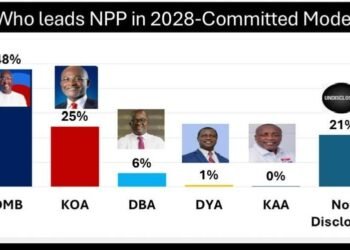Ghana, often touted as an IMF poster boy, finds itself in the grip of an unprecedented economic crisis, drawing concern from citizens and technocrats alike.
In 1970, Ghana visited the IMF for the first time and has since visited the institution 18 times. The goal of all the visits has been to readjust the country’s fiscals to reposition the economy for growth.
However, the growth in the cases where some sort of growth was witnessed has always been a little to write home about.
Professor Godfred Bokpin, a distinguished Economics professor at the University of Ghana, has bemoaned the current situation in which the country’s economy finds itself.
Professor Bokpin’s apprehensions revolve around Ghana’s fiscal trajectory, pinpointing the absence of a coherent tax policy as the root cause of the nation’s financial predicament. In a scathing critique, he characterizes the actions of successive governments over the past two decades as acts of “robbery,” denouncing the lack of a well-thought-out tax strategy.
“Then again, that is just one level. If you look at personal income tax, other consumption-based taxes, and the rest of them, what we are doing as a country is creating a financially distressed society where just a few people will be able to get to the top. You may find something like this in some other countries probably in terms of effective marginal tax but in those countries, the state is very efficient in the delivery of public services; water, education, electricity, and free moves with quantity and quality.”
Professor Godfred Bokpin

Shifting focus to Ghana’s relationship with the Bretton Woods Institutions, particularly the International Monetary Fund (IMF) and the World Bank, scrutiny has intensified regarding their impact on the structure of the Ghanaian economy. With Ghana seeking financial assistance from these institutions on the last 17 occasions, questions arise about the long-term consequences of such engagements.
While the Bretton Woods Institutions play a vital role in providing financial support and policy advice to member countries, concerns have emerged about the impact on Ghana’s economic independence and structural stability due to frequent engagement. Critics argue that the reliance on external financial aid, often accompanied by stringent conditions, may compromise Ghana’s sovereignty and hinder its ability to pursue independent economic policies.
The conditions attached to loans and programs from the IMF and World Bank often involve economic reforms, fiscal discipline, and austerity measures. While these measures are intended to address short-term economic challenges, there are worries about their impact on the structure of the Ghanaian economy. Some argue that the prescribed policies may prioritize debt repayment over long-term sustainable development, potentially exacerbating income inequality and social disparities.
It is strongly believed that the current budget was not prepared independently by the government, as it had to meet key IMF conditionalities to release the second tranche of IMF assistance.
Additionally, the recurrent visits to the Bretton Woods Institutions suggest underlying issues in Ghana’s economic management, leading to recurring financial crises. Critics contend that the reliance on external support may indicate weaknesses in domestic policy formulation and implementation. Over time, this pattern can erode investor confidence and hinder private sector growth, affecting the overall structure of the economy.

Furthermore, the conditions set by the IMF and World Bank may focus on macroeconomic stabilization but may not address structural challenges, such as unemployment, inadequate infrastructure, and over-reliance on commodity exports. Critics argue that a more comprehensive approach, considering the long-term structural issues, is essential for sustainable economic development.
In response to the scrutiny, proponents of the engagements emphasize the need for immediate financial assistance during economic crises. They argue that the conditions attached to the loans are necessary to restore fiscal discipline and macroeconomic stability, paving the way for sustainable growth.
Ghana’s continued engagements with the Bretton Woods Institutions requires a balanced and strategic approach. While short-term financial support may be crucial, policymakers must address the root causes of economic vulnerabilities to reduce the frequency of visits and enhance the overall resilience and structure of the Ghanaian economy.
Ghana’s private sector, a vital driver of economic growth, has witnessed minimal expansion over the last two decades. This stagnation to the government’s inability to establish an effective and comprehensive tax regime; troubling trend where state-owned enterprises have experienced significant growth and employment, while the private sector has lagged. This has perpetuated a financially distressed society, concentrating wealth and opportunities among a privileged few.
The austerity measures imposed through taxes posited that these measures have stifled the private sector’s growth. The consistent application of austerity over the years, evident in Ghana’s budgets since 1996, has impeded the private sector’s ability to expand and significantly contribute to the nation’s economic development. The professor cautions against the inherent tradeoff between austerity tax regimes and economic growth, contending that the emphasis on fiscal consolidation measures has resulted in insufficient growth, exacerbating the country’s economic distress. In light of these challenges, calls for a departure from the current approach, advocating for policies that prioritize inclusive growth and the welfare of the broader population.
“So when you look at the statistics, over the years, you look at the private sector you don’t see expansion going on much. And it is not rocket science. You cannot be doing things in austerity year in and year out, and you check Ghana’s budget effectively from 1996 coming, the first two years of the budget are full of austerity measures. Now the idea is that it is very difficult to pursue inclusive growth and austerity at the same time.”
Professor Godfred Bokpin
Ghana must look in the more to heal itself of this canker.
READ MORE: Ghana’s Tax Policy Is “Robbery”























